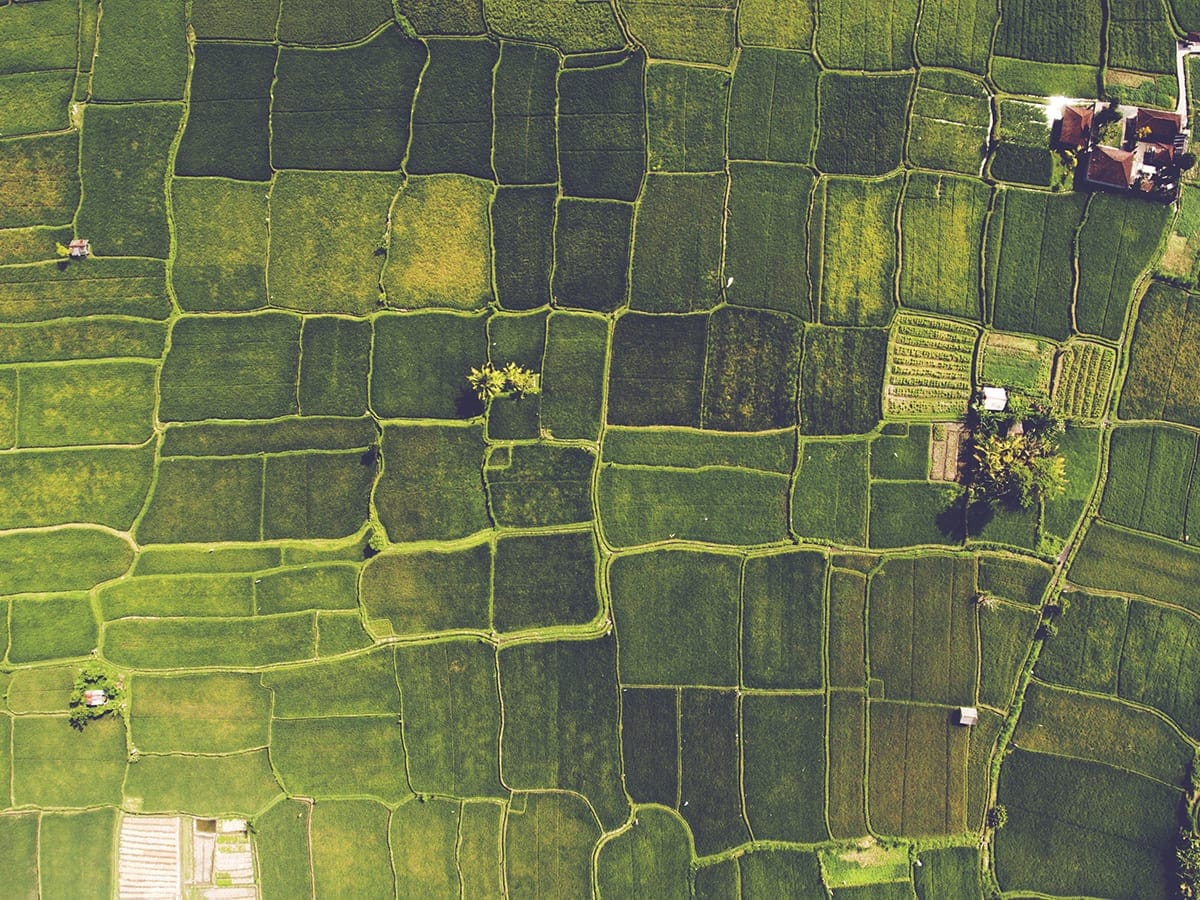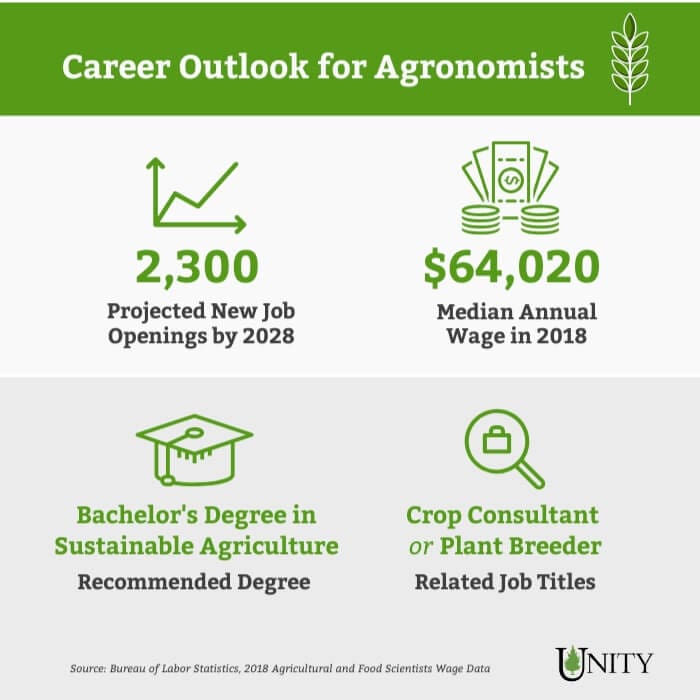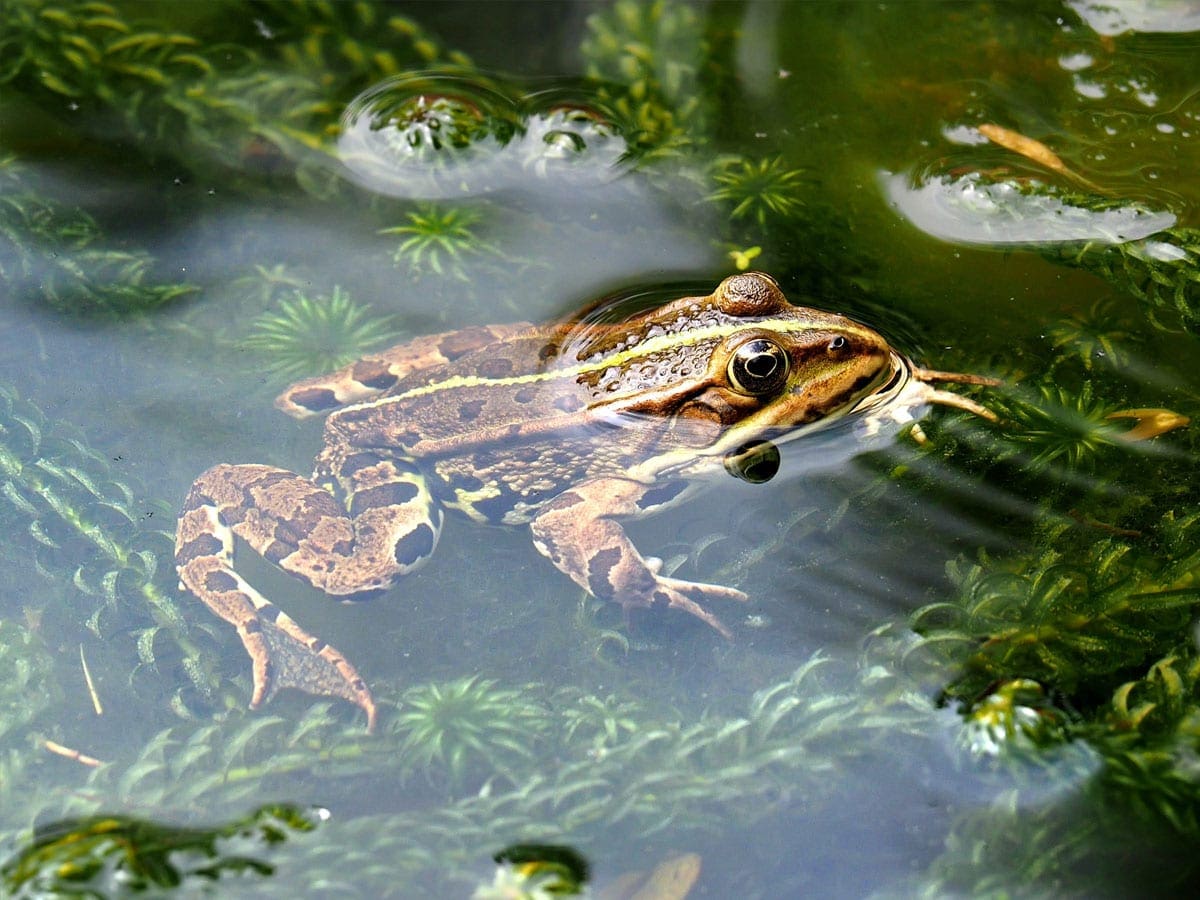
How to Become an Agronomist
Agronomy is a rewarding environmental career where workers can make an impact on both the environment and the food we eat. Find out how to become an agronomist with this career guide.
You may find an agronomist performing research in the field, laboring in soil and water conservation, coordinating crop production and management, or working toward sustainable development.
-
- What is an Agronomist?
- Famous Agronomists
- Key Tasks & Duties
- Key Skills
- Work Environments
- Salaries
- Job Outlook & Growth Rate
- Educational Requirements
- Related Degrees
- Related Careers
Agronomist Fast Facts
| Education Requirements | 4-Year Bachelor’s Degree |
|---|---|
| Recommended Degree Program | B.S. in Environmental Science |
| Median Salary (2018) | $64,020 per year |
| Workers Employed in U.S. (2018) | 35,600 |
| Projected Job Openings by 2028 | 2,300 |
| Projected Growth Rate | 7% (Faster than average) |
| Other Job Titles | Crop Consultant, Plant Breeder |
| Related Careers | Hemp Farmer |
Bureau of Labor Statistics, 2018 Agricultural and Food Scientists Wage Data
If you have found yourself asking, “How do I become an agronomist?” read on to find out exactly what an agronomist does each day, and which skills and traits are key for this career. In this guide, we’ll answer questions like
“How much does an agronomist make?” And “What does an agronomist study?” Plus, we’ll cover salary expectations and job demand predictions, too.
What is an Agronomist?
What is agronomy? An agronomist, or crop scientist, studies plants and how they can be grown, modified, and used to benefit society. They use science to carry out experiments that create new techniques for agriculture production.
Agronomy has existed and been important for humans since the invention of farming. However, as the population has sky-rocketed in recent years, agronomy has never been more important. The continually increasing number of mouths to feed means that optimizing crops to be as lush and healthy as possible has become a top priority.
Famous Agronomists
Agronomy has contributed a lot to society – from what we eat, to how we eat, to how it’s grown, and so much more. Although you may not recognize the names of these famous agronomists you might recognize their contributions to the field.
- Henry Wallace (1888 – 1965) :Wallace, the Vice President under President Teddy Roosevelt, is most famous for the development of the food stamp and school lunch programs that we still use today.
- Rachel Carson (1907-1964) :Carson’s book Silent Spring is the most influential book in agriculture when it comes to pesticide use; it resulted in DDT being banned. It’s read in college courses across the country.
- Robert Fraley (1953-present) :Fraley is a controversial man. His research led to the commercialization of genetically modified organisms (GMOs) from Monsanto.
What Does an Agronomist Do?
Agronomists spend a lot of time coming up with experiments to improve plants’ durability, survival, and yield. The ultimate goal is to create the most abundant, vibrant crops possible.
What tools do agronomists use?
A field agronomist’s tool kit involves:
- Different sizes of shovels
- Soil thermometer
- Guide books
- A tablet
- Plant stand density tool
- Clippers
- Insect tools
- Some use various types of software to understand plant/soil quality
Key Skills
As with just about any field, there are key skills that employers may look for when hiring an agronomist. Due to varying day to day and season to season responsibilities, these professionals should have a versatile skill set.
- Ability to gather and analyze data
- Firm grasp of mathematical concepts
- Observation and attention-to-detail
- Strong report and correspondence writing skills
Key Traits
Personality characteristics are also important in agronomy. Having a curious-mind for learning the ins and outs of how things work, paying close attention to detail, and enjoying hands-on projects are a must.
- Investigative
- Enterprising
- Leader
- Detail-oriented
- Independent
Agronomist Job Descriptions
What does an agronomist do daily? This depends on what area they specialize in. They may focus on soil conservation, plant breeding, field or lab research, education, or seed/fertilizer/chemical sales.
With that in mind, what do typical agronomist job descriptions look like? Let’s take a look at a few of the most common job titles.
Agrologist vs Agronomist
One thing to keep in mind when browsing jobs in agronomy is that in some places, including Canada, agronomy is called agrology. It’s a simple variation that means the same thing, but it can make all the difference during the job search if you look outside the United States for a career as a ‘professional agrologist.’
Sales Agronomist
What is a sales agronomist? They provide support and knowledge of their agronomic products to customers and their main goal is to sell products across their sales territory. Their general duties include:
- Provide product advice
- Make agronomic related decisions regarding production
- Develop and implement agronomic plans to support customer and maintain maximum production
- Develop and implement regional agronomic marketing plans
- Organize trial programs for customers
Agronomist Engineer
What is an agronomist engineer? They work on a variety of things ranging from farming and forestry to planning animal environments to finding better ways to process food. For the purpose of providing specifics, the following are expected responsibilities of a senior-level agronomist engineer:
- Prepare reports for internal and external stakeholders
- Create and oversee plans for construction and agricultural management
- Manage projects and budgets
- Communicate effectively with government agencies, clients, and other stakeholders
- Research and design sustainable equipment and systems
Field Agronomist
A field agronomist is a very hands-on career path. This person will generally plan, budget, perform, and document research related to agronomic crops. A field agronomist job description includes:
- Prepare documented proposals for, establish, manage research trials
- Make agronomic related decisions regarding production
- Develop, conduct, and evaluate tolerance for species at the seedling stage of growth
- Evaluate products, collect varied data, and make recommendations
- Understand farmland
Agronomist Consultant
Agronomist consultants can work in a variety of industries. Consultants may provide advice on agricultural development strategies or the best use of agricultural land as it relates to pollution, crop rotation, or forestry. Whatever area their specialty, sustainability tends to be at the center.
- Conduct land valuations
- Measure, analyze, and interpret data
- Give presentations and prepare reports
- Write technical publications
- Advise compliance with current legislation
Where Do Agronomists Work?
An agronomist will spend time working both indoors and outdoors. When creating plans or updating reports, you’ll find them in an office. If working in education, these professionals may travel to classrooms or college campuses to give lectures and presentations.
Outdoors, agronomists may take samples or inspect equipment and structures. Some travel is required for these roles, particularly when working outdoors.

What is the Average Agronomist Salary?
The exact salary numbers depend on how long a person has worked in the field, as well as their specialization. The Bureau of Labor Statistics offers information on industries related to agronomy with the highest level of employment and their mean wages.
| Industry | Employment | Annual mean wage |
|---|---|---|
| Other Food Manufacturing | 1,990 | $78,240 |
| Management of Companies and Enterprises | 1,500 | $82,250 |
| Dairy Product Manufacturing | 1,280 | $68,400 |
| Grain and Oilseed Milling | 1,140 | $85,370 |
| Scientific Research and Development Services | 1,120 | $87,460 |
Bureau of Labor Statistics, 2018 Agricultural and Food Scientists Wage Data
Trainee Agronomist Salary
Salary estimates for an agronomist depend largely on experience and specialization, so it only makes sense that an agronomist in training makes less than their senior-level counterparts. As an example, the 25th percentile for a sales agronomist salary is $60,000.
Chief Agronomist Salary
An agronomist with many years of experience, regardless of specialization, can expect to earn more than those beginning at lower levels. Additionally, those with professional degrees such as a master’s degree may enter the industry at a higher level of wage. For example, the 75th percentile for a chief sales agronomist salary is $83,000.
What Is the Job Demand for an agronomist?
As of May 2018, there were approximately 35,600 jobs in agronomy. According to the Bureau of Labor Statistics, agronomy employment is growing at about an average pace of 7%. Between 2018 and 2028, approximately 2,300 new jobs are expected to be added in this field.
Agronomist Education Requirements
There are agronomist education requirements that must be met before entering into the field. A career in agronomy requires a bachelor’s degree – at a minimum. Though a four-year degree or higher is required, education for aspiring agronomists can truly begin as early as high school.
Agronomist High School Recommendations
The journey of becoming an agronomist can begin in high school. Taking courses in high school will help prepare students for more advanced university classes that will be required for their college major.
There are many relevant course options available to high schoolers. Students should consider taking science classes such as environmental science and biology and math classes like trigonometry and calculus.
Agronomist Degree Requirements
What degree do you need to become an agronomist? At a minimum, agronomists require a Bachelor’s degree, which usually takes four years.
Additional two-years experience in the field is needed to climb the career ladder; years which can be entry-level positions or agronomist apprenticeships. A master’s degree and/or further certifications can be required for some higher-level positions.
Recommended Degrees
Unity Environmental University offers a range of environmental degrees based on a framework of sustainability science. Aspiring agronomists seeking a high-quality education and a vibrant, supportive culture should consider the following degree programs:
- B.S. in Environmental Studies: A degree in environmental studies can open up the door for many careers in agronomy. Agronomists with a degree in this field of study often focus on sustainable development.

Ready To Learn More About Unity Environmental University?
Agronomist Related Careers
There are many careers related to agronomy. The environmental, agricultural, biological, and horticultural knowledge required to become an agronomist allows a person to have a well-rounded science education and pursue other career paths.
Some examples include:
- Plant Breeder: Plant breeders apply biotechnology and molecular breeding strategies to improve the performance of plants and crops. They may do research in food science, at a university, or for the government.
- Soil Conservationist: A soil conservationist monitors the condition of the land and creates ways to increase sustainability, conserve water, and battle erosion.
- Greenhouse Manager: A greenhouse manager cultivates all types of plants in a controlled environment to be used for research or sale. They supervise plant-breeding, plant growth, plant nutrition, disease control, and maintenance systems in a greenhouse.
Additional Certifications and Licenses
Are additional certifications or licensing necessary after completing a degree? Although additional certifications aren’t necessarily required for all agronomist roles, they can boost your resume and give you a leg up on competitors.
However, some higher-level jobs do require certifications. Generally, a four-year degree and two years of work experience are the base requirements to begin courses. There are three common certifications that can be considered.
- Certified Professional Agronomist: This is a certification program of the American Society of Agronomy. It earns agronomy professionals more opportunity, recognition, respect, and pride in their work.
- Certified Crop Adviser: This is also a program of the American Society of Agronomy. A crop consultant certification is best for professionals who advise farmers or growers on agronomic practices.
- Certified Professional Soil Scientist: Professional soil scientists should get this certification from the Soil Science Society of America to remain up-to-date on best practices. Employers and government agencies use this certification to identify professionals suited to their jobs.
Next Steps…
If the amazing potential of plants and land is your passion and you’re an investigative and analytical leader, becoming an agronomist may be for you. Agronomy is an influential field and, although it has always been important, it now has the capability to change the world.
Explore Unity degrees that will prepare you for a successful career as an agronomist or investigate other environmental career paths in our blog.
Visit us or reach out to admissions today.
Degree Programs







